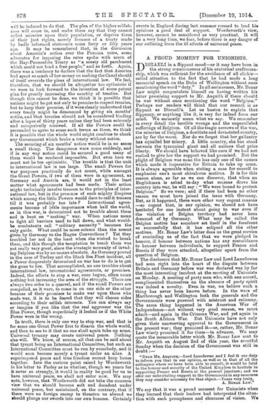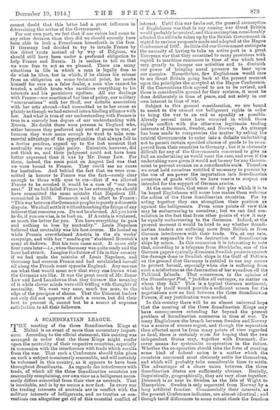A PROUD MOMENT FOR UNIONISTS.
DISRAELI in a flippant mood—or it may have been in the strong consciousness of his oratorical craftsman- ship, which was sufficient for the avoidance of all cliches— called attention to the fact that be had made a long memorial speech on the Duke of Wellington without once mentioning the word " duty." In all seriousness, Mr. Bonar Law might congratulate himself on having written his letter promising support to Mr. Asquith if there should be war without once mentioning the word " Belgium." Perhaps our readers will think that our remark is as flippant as Disraeli's. Let us hasten to explain that flippancy, or anything like it, is very far indeed from our mind. We earnestly mean what we say. We remember in every detail the terrible wrongs and the unparalleled sufferings of Belgium. Of all the tragic sorrows of the war, the miseries of Belgium, a destitute and devastated country, are by far the worst. Nor do we forget that her gallantry has equalled her misery. A little country, she has stood between the tyrannical giant and all nations that prize liberty. We should have behaved like curs if wo had not rushed to give her the support we had promised. But the plight of Belgium was none the less only one of the causes which made it imperative for Britain to take up arms. It is always agreeable when stating a case for oneself to emphasize one's most chivalrous motives. It is for this reason alone, so far as we can discover, that when an Englishman is asked to-day what reasons drove his country into war, he will say : " We were bound to protect Belgium." So we were; and if there had been no other reason we must have joined the issue with Germany. But, as it happened, there were other very cogent reasons —so cogent that, in our opinion, we should not have hesitated for one instant about going to war even if the violation of Belgian territory had never been dreamed of by Germany. What may be called the Belgian motive has somehow set itself in the forefront so successfully that it has eclipsed all the other motives. Mr. Bonar Law's letter does us the great service of reminding us of the fact that we were pledged in honour, if honour between nations has any resemblance to honour between individuals, to support France and Russia if they were attacked, altogether apart from the question of Belgium. The disclosure that Mr. Bonar Law and Lord Lansdowne had seen right into the heart of the dispute between Britain and Germany before war was declared was by far the most interesting incident at the meeting of Unionists on Monday. A meeting of party men who, with one accord, complimented themselves on the absence of party spirit was indeed a novelty. Even in war, we believe such a thing has never been known before. In the wars of Marlborough and Wellington both the generals and the Governments were pursued with mistrust and calumny. The same thing happened in the American War of Independence—not without very good reason, we must admit—and again in the Crimean War, and yet again in the South African War. But Unionists have not only given their unswerving approval to the Government in the present war; they promised it—or, rather, Mr. Bonar Law wisely promised it for them—in advance. We may quote the memorable letter which Mr. Bonar Law sent to Mr. Asquith on August 2nd of this year, the eventful Sunday when the decision of the Government was still in doubt :- "Dias Ma. ASQUITH,—Lord Lansdowne and I feel it our duty to inform you that in our opinion, as well as in that of all the colleagues whom we have been able to consult, it would be fatal to the honour and security of the United Kingdom to hesitate in supporting France and Russia at the present juncture ; and we offer our unhesitating support to the Government in any measures they may consider necessary for that object.—Yours very truly, A. Bolus LAW."
We say that it was a' proud moment for Unionists when they learned that their leaders had interpreted the situa- tion with such promptness and clearness of vision. We cannot doubt that this letter bad a great influence in determining the action of the Government. For our own part, we feel that if our rulers had come to any other decision than they did we should scarcely have been able to look a Frenchman henceforth in the face. If Germany had decided to try to invade France by the direct route instead of by way of Belgium, we should still have been under a. profound obligation to help France and Russia. It is useless to tell us that we were free to act as we pleased. There are many situations in life in which a man is legally free to do what he likes, but in which, if be claims his release from an obligation on some technical point, he marks himself for ever as a false dealer, a man who cannot be trusted, a selfish brute who sacrifices everything to his interests and his pernicious egotism. All our dealings with France—our sanction of her line of policy, our military " conversations " with her Staff, our definite association with her acts abroad—had committed us to her cause as plainly as though we had entered into a binding alliance with her. And what is true of our understanding with France is true in a scarcely less degree of our understanding with Russia. No doubt there were persons in England who, either because they preferred any sort of peace to war, or because they were mean enough to want to take com- mercial advantage of the opportunities that always fall to a tertius gaudens, argued up to the last moment that neutrality was our right policy. Unionists, however, did not think so, and their judgment could not have been better expressed than it was by Mr. Boner Law. For them, indeed, the main point on August 2nd was that we wore bound to France. They could see no cause for hesitation. And behind the fact that we were com- mitted in honour to France was the fact—surely clear enough to those with eyes to see—that if we allowed France to be crushed it would be a case of "our turn nest." If we bad failed France in her extremity, we should have committed the same mistake that Napoleon III. committed in 1866. Bismarck said in effect to France : "This war between the Germanic peoples is purely a domestic dispute. We shall settle it withouttouching the fringe of any interest that concerns you. Do not be alarmed. All you have to do, if you are wise, is to look on. If Austria is weakened, so much the better for you. You have everything to gain and nothing to lose by neutrality." Louis Napoleon believed that neutrality was his best course. He looked on while Prussia overwhelmed Austria in the six weeks' campaign, and with her " needle-gun " shattered Benedek's army at Sadowa. But his turn came nest. It came only four years later—i.e., when Germany was quite ready and the hour had struck. Imagine the future of life in this country if we had made the mistake of Louis Napoleon, and Germany had overrun France and had established herself all along the French coast opposite England. Any one can see what that would mean now that every one knows what the Germans are like. It was the great merit of Mr. Bonar Law and Lord Lansdowne that they foresaw the meaning of it while slower minds were still trifling with thoughts of neutrality. We went very near, much too near, to the edge of the precipice of shame. That the Unionist leaders not only did not approve of such a course, but did their best to prevent it, cannot but be a source of supreme satisfaction to all their followers.







































 Previous page
Previous page